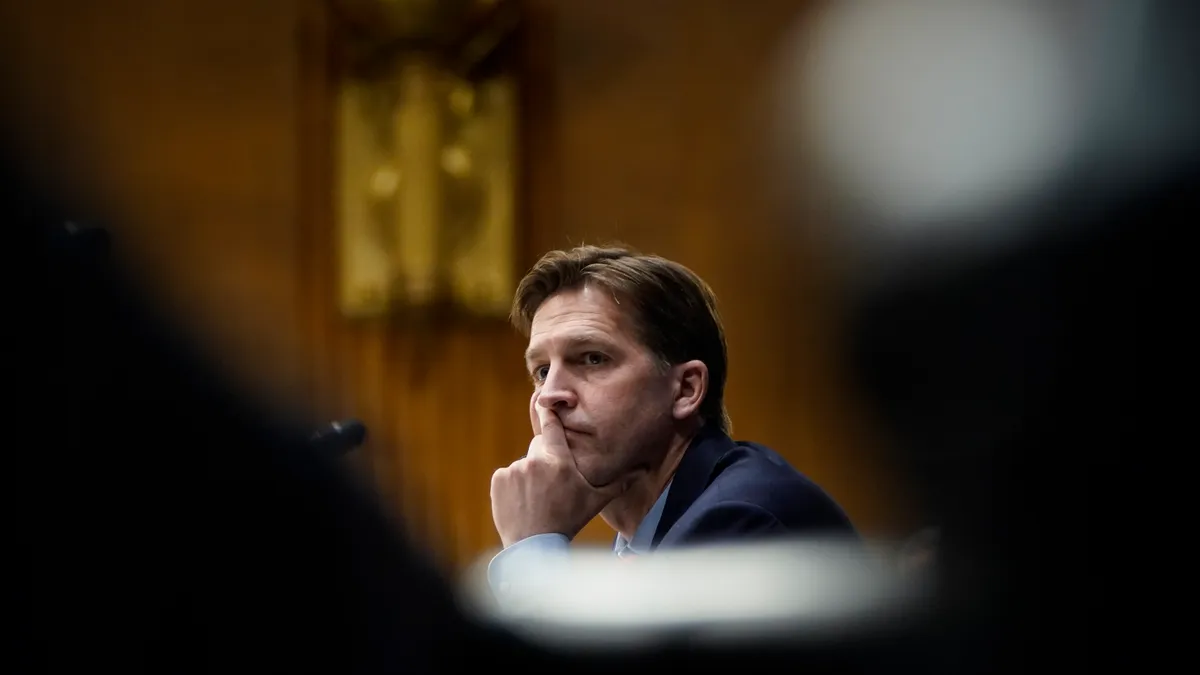Dive Brief:
- The University of Florida’s faculty senate Thursday evening passed a no confidence vote in the presidential search process that led to the presumed pick for the job, U.S. Sen. Ben Sasse.
- The faculty senate in a 67-15 vote approved a resolution stating that search procedures prevented instructors from learning about other presidential candidates. University officials have said 11 other contenders pulled out of consideration because they wanted to be named the sole finalist, as Sasse ultimately was.
- Some faculty members at the senate’s Thursday meeting shared concerns the no confidence vote would be misinterpreted as targeting Sasse himself, rather than the search process. Sasse, a Nebraska Republican, has been met with student protests and criticisms over anti-LGBTQ and other stances he’s taken as a legislator.
Dive Insight:
News of Sasse’s imminent appointment as the University of Florida’s 13th president roiled the campus and brought complaints both against an opaque search process and the senator’s legislative record.
Officials earlier this month named Sasse the exclusive finalist to take the reins of the prominent research and public flagship institution that enrolls more than 60,000 students a year.
Search committee members touted Sasse’s leadership skills and experience as president of Midland University, a private nonprofit Lutheran-affiliated institution in Nebraska. He was elected to the Senate in 2014 while leading Midland, which he had overseen since 2010.
But his track record apparently did little to impress the student body in Florida. Some students earlier this month protested, filling a venue where Sasse was addressing the campus, “chanting loudly, banging their fists on windows, walls and furniture,” according to a message from current President Kent Fuchs.
The incident prompted the university to say it would enforce a decades-old rule banning indoor protests when the governing board considers Sasse’s appointment Nov. 1. Sasse is expected to vacate his Senate seat later this year.
Critics have objected to Sasse’s views against the U.S. Supreme Court ruling legalizing same-sex marriage, as well as his take on tenure rights.
But the faculty senate in its resolution did not focus on Sasse directly or his political views. Rather, the body took issue with the search process that ended with his selection.
The resolution references a new state law dictating public colleges can’t disclose the identities of presidential candidates until the final stages of a search.
Supporters of the law said it would shield candidates from professional fallout — they feared high-quality presidential contenders would be less likely to apply, lest they jeopardize their current positions.
Members of the search committee liked candidates other than Sasse, but unanimously landed on him as the only finalist, Lisa Lundy, an agricultural communication professor and search committee representative, said during Thursday’s meeting.
All of the other candidates being considered pulled out because they did not want their names shared publicly at the search’s end, Lundy said.
Some faculty members at the meeting expressed skepticism about this, wondering whether the candidates were prodded to drop out. Lundy denied this occurred.
Other professors said they feared the no confidence vote would be confused as criticizing Sasse as a leader, rather than the process. Some faculty members did, however, directly blast the Republican’s views during the meeting, saying they do not match the university’s values.
University of Florida spokesperson Steve Orlando said in an email that officials did not have a comment on the vote. But he said that the consultant involved with the presidential search advised that if they were “to publicly disclose more than one name, in their professional opinion, it would materially adversely impact the quality of the prospects that we would be able to attract.”
A spokesperson for Sasse did not immediately respond to a request for comment Thursday.
The faculty senate at the meeting added a line to the resolution, which had been drafted before Thursday. The addition read that though three faculty members were on the search committee, they were unable to confer with the senate and thus did not “fairly represent” professors at large.
The no confidence vote does not affect Sasse’s standing as a candidate, still clearing the way for him to be approved by the university's board of trustees next week.
Florida has a history of installing politicians into high-profile higher education positions. Recently, the State University System of Florida picked state Sen. Ray Rodrigues, a Republican, as its next chancellor.
Rodrigues is a close ally of Florida Gov. Ron DeSantis, a Republican who has disrupted the state’s higher ed systems, helping spearhead laws like one requiring administration of a “viewpoint diversity” survey to public campuses and another forcing institutions to regularly switch accreditors.














